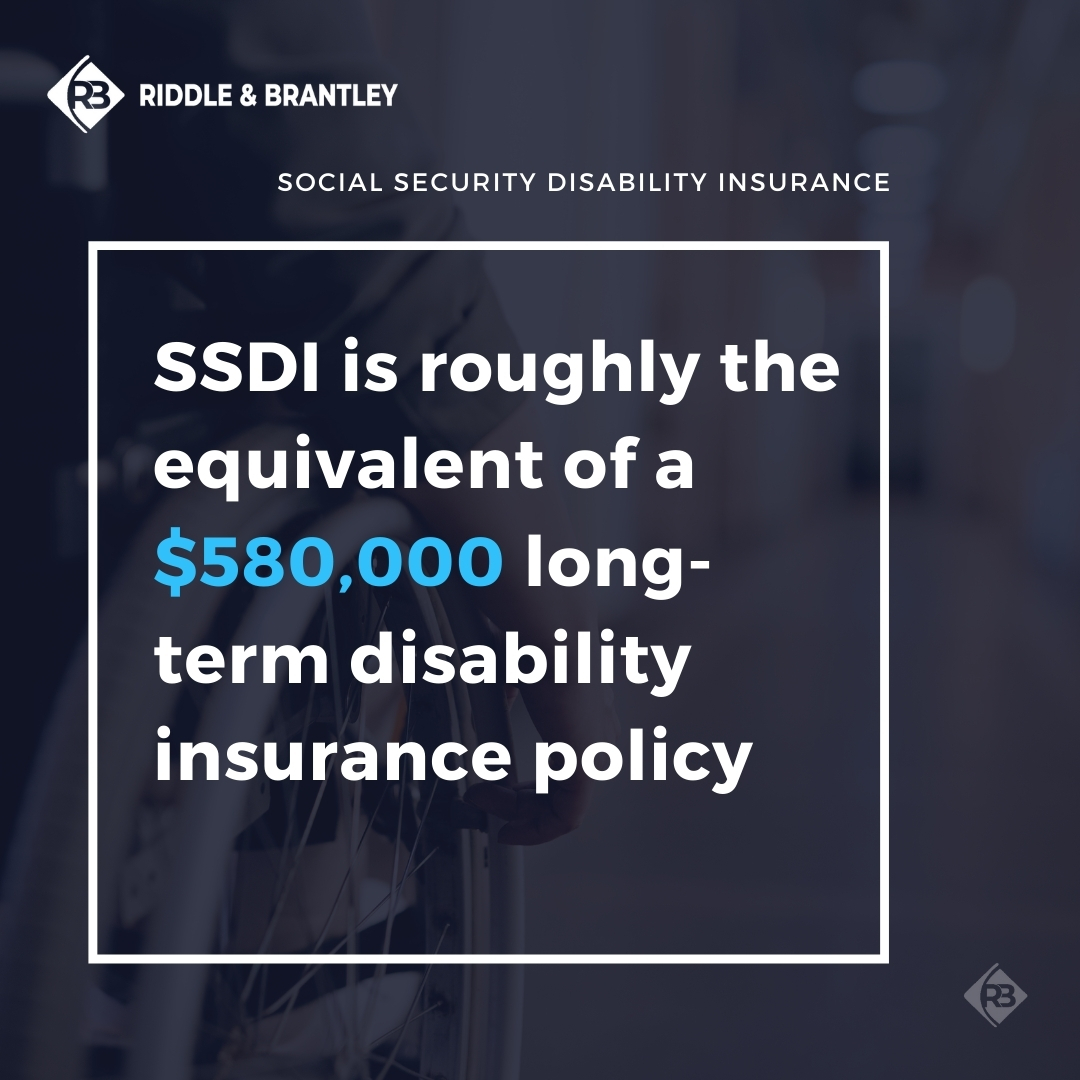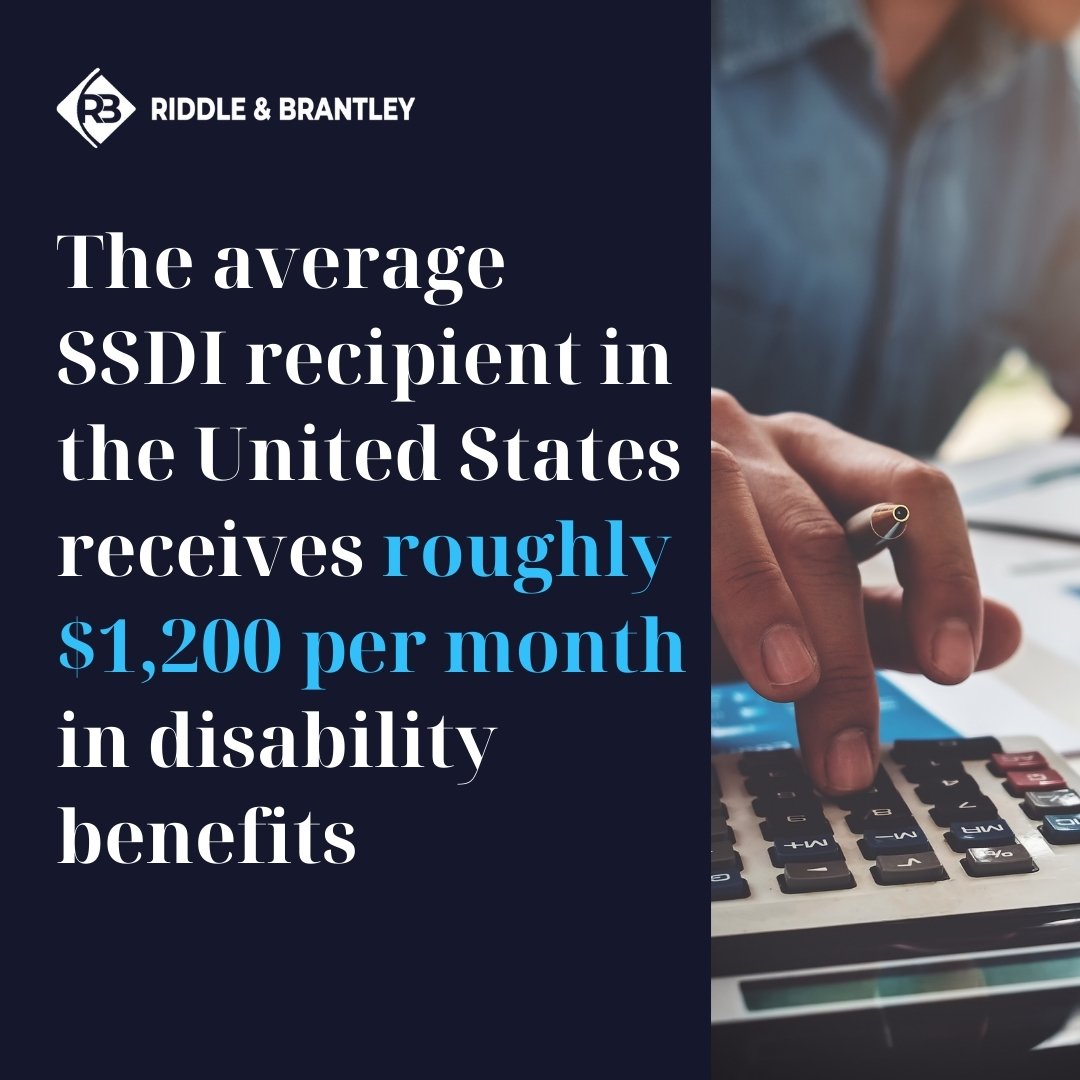For most of our working lives, Social Security Disability Insurance (SSDI) is merely a background concern. The only time we think about it is when we check to see how much money the federal government has taken out of our paychecks.
For many Americans, however, disability benefits are incredibly important.
Social Security Disability: Why It Matters
It’s often when tragedy strikes that we realize the importance of this fundamental government disability insurance program. After an accident or illness which results in permanent disability, SSDI becomes a lifeline for those who can no longer work. If you are ever severely disabled, take comfort in knowing that you have been paying into the country’s largest disability insurance program, one that will be able to provide for you and your family despite your illness or disability.
IMPORTANT: If you have been denied SSDI benefits, the experienced Social Security disability team at Riddle & Brantley can help. We have decades of experience fighting for those afflicted by serious illnesses and disabilities, and can help you get the benefits to which you are entitled. Please call 1-800-525-7111 for a FREE, no-obligation consultation with a North Carolina disability lawyer today.
History of Social Security Disability Insurance

The Social Security Administration (SSA) was established more than 80 years ago to provide insurance and security for American workers and their families against the hardships of everyday life. In 1956, Congress realized that most private workers did not have (or could not afford) long-term disability insurance. Accordingly, the SSA was expanded to include disability insurance for workers through the SSDI program.
SSDI has steadily expanded since 1956. After the 1950s, the United States experienced a huge population surge as a result of Baby Boomers born after World War II. By 1976, record numbers of people were seeking SSDI benefits, on account of both the Baby Boomers entering the workforce in earnest, and more women seeking work outside of the home.
The exponential growth of the SSDI program leveled off around 2008, as most Baby Boomers reached retirement age. Once a person is of retirement age (currently 67) he or she is no longer able to collect SSDI benefits.
Today’s SSDI Program
If you’ve spent your adult years working and paying federal income taxes, then you’ve been funding your own disability insurance. For the average American worker with a spouse and two children, SSDI is roughly the equivalent of a $580,000 long-term disability insurance policy.

SSDI is funded by payroll taxes – those deductions you see on your pay stub. Currently, 6.2% of a worker’s income goes to the Social Security Administration, where the funds are split between SSDI and Social Security retirement benefits. The 6.2% tax is only taken from the first $117,000 a worker makes — if you make more than this, your additional income is not subject to the tax.
US Disability and Worldwide Systems Comparison
Most developed countries around the world also provide disability insurance for their workers. In comparison to these countries, the U.S. spends very little federal money funding the SSDI program. While the percentage of U.S. workers receiving disability benefits is on par with workers in most other countries, American workers receiving disability benefits generally have to meet more stringent disability requirements and receive less money on a monthly basis.
This only underscores the importance of consulting with an experienced disability attorney when you’re seeking benefits — or looking to appeal a denial. For a FREE, no-obligation consultation with an experienced NC disability lawyer, please call 1-800-525-7111 today.
Who Receives SSDI Benefits?
Virtually every working age person in America is covered by SSDI. Over 160 million people, including 91% of those aged 21 through 64, pay part of their wages towards Social Security programs. This is especially important in light of estimates that one out of every three workers today will need disability benefits before retirement age.
Currently, approximately 9 million people receive SSDI benefits, which includes over a million disabled veterans (for whom VA disability benefits are available). In addition to the workers themselves, 157,000 spouses and more than 2 million children receive Social Security benefits as a result of their loved one’s work history.
Most people who receive SSDI benefits are in their 50s and 60s. The majority worked in unskilled or semi-skilled work, such as construction or other jobs involving physical types of labor.
What Benefits Does Social Security Disability Insurance Provide?
The amount of SSDI benefits a person will receive is based on his or her lifetime earnings prior to their disability. SSDI payments usually replace a little less than half of your past earnings (subject to a cap for higher-earning individuals).
Contrary to common belief, SSDI benefits do not provide a lot of money, even though 80% of recipients use it as their main source of income. As a result, 20% of people receiving SSDI benefits live in poverty. Without SSDI, however, the number of disabled persons living in poverty would be far greater.
Average Disability Benefits in the U.S.
In the United States, the average disabled worker receives around $1,200 per month in SSDI benefits. After two years of disability, SSDI recipients are also eligible for health care coverage through Medicare just as though they were 65 years old, which also helps to ease their financial burden.

For those whose disabling conditions improve over time, the Social Security Administration encourages disabled workers to test out their ability to work and eventually reenter the work force.
For up to 12 months, recipients can attempt to earn as much as they are able without losing any SSDI benefits. If they earn more than around $1,200 for more than 12 months, they will enter an extended period of eligibility for three years, which will allow them to work full time, but receive benefits if their income in any month falls below that $1,200 amount. In addition, for five years after the extended eligibility period ends, recipients will be able to use an expedited process to resume their benefits if their disability once again prohibits them from working.
Types of Disabilities That Qualify for Social Security Disability Benefits
The five most common categories of SSDI disabilities and their prevalence are:
- 32% — Mental impairments (schizophrenia, PTSD, intellectual disabilities, bipolar disorder, etc.)
- 30% — Musculoskeletal or connective tissue disorders
- 20% — Cancers, infectious diseases, or other injuries
- 9% — Cardiovascular conditions like chronic heart failure
- 9% — Nervous system disorders (cerebral palsy, multiple sclerosis, etc.)
Eligibility for SSDI
In order to be eligible for SSDI benefits, workers must have a severe illness or disability which prevents them from any type of significant gainful employment. Because SSDI is only available to those with debilitating impairments and life-threatening diseases, many people who apply for benefits are denied. In fact, less than four out of every ten applicants are approved for disability benefits, which underscores the importance of consulting with an attorney when seeking SSDI.
“Meaningful Employment”
In order to be considered disabled, a person must not be able to engage in any meaningful employment. “Meaningful employment” means any job where a person earns more than about $1,200 per month.
In addition, a worker must also have earned coverage in the SSDI system before benefits can be approved. The number of years a worker will need to pay taxes into the system varies based on age, but in general, a person needs to have worked for at least ten years, five of those years being within the past ten years.
Even if a person is unable to work and has sufficient work history, it can still be difficult to get approved for benefits. When considering whether or not someone’s disability will qualify for SSDI benefits, the Disability Determination Services (DDS) offices of the Social Security Administration will consider a person’s age, education, and work experience. It is not enough to show that you are unable to do the work you used to do—your disability must also prevent you from doing any substantial gainful activity even if it is a lot simpler and easier than jobs you have done in the past.
Finally, a person’s disability or illness must be expected to either last for more than a year, or end in death. Temporary or short-term disabilities do not qualify for SSDI benefits. An applicant will need substantial medical evidence from acceptable sources in order to prove the extent of their disability.
SSDI: Helping Americans with Disabilities Support Themselves

Every American should take comfort in knowing that there is a program of financial support after devastating injuries and illnesses. SSDI benefits allow former workers to provide for themselves and their families after years of paying into the insurance program.
You have paid for this coverage with every year you worked. If you need SSDI benefits but have been denied, you need the help of experienced Social Security Disability lawyer like those at Riddle & Brantley.
Experienced North Carolina Disability Lawyers
Please call 1-800-525-7111 or complete the fast and easy form below to have your claim reviewed for free by our legal team.
Our team has handled thousands of disability claims in North Carolina and we are ready to help however we can.
"Without your help, I would not have received my Social Security disability benefits."
-Charlotte R., Riddle & Brantley client
Call 1-800-525-7111 today and let’s review your claim.
There are no upfront costs and you won’t pay any attorney fees unless we win your case or appeal and you receive disability benefits.
Justice Counts.
*** Disclaimer: The results mentioned are intended to illustrate the type of cases handled by the firm. These results do not guarantee a similar outcome, and they should not be construed to constitute a promise or guarantee of a particular result in any particular case. Every case is different, and the outcome of any case depends upon a variety of factors unique to that case.